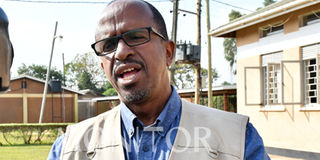Cash-strapped WFP needs Shs700b

Mr Abdirahman Meygag, the WFP Country representative, speaks to the media at Gulu University in Gulu City yesterday. PHOTO | TOBBIAS JOLLY OWINY
What you need to know:
- Speaking in an interview in Gulu City yesterday, Mr Meygag Abdirahman, the WFP country representative to Uganda, said they will need the money to cater for refugees this calendar year.
The United Nations’ humanitarian food agency, the World Food Program (WFP), will require approximately $200 million (about Shs736 billion) to secure and supply food to refugees currently hosted across Uganda, the Daily Monitor has learnt.
Speaking in an interview in Gulu City yesterday, Mr Meygag Abdirahman, the WFP country representative to Uganda, said they will need the money to cater for refugees this calendar year.
“This year alone, we are talking about roughly $200 million. We are talking about huge funding required to feed the over 1.4 million refugees,” he said.
Uganda is one of the most important refugee host countries in the world and the largest on the African continent.
By the start of 2022, the UN refugee body said Uganda was already hosting more than 1.5 million refugees. Of the number, a projected 950,000 refugees settled in Northern Uganda and West Nile regions.
Mr Abdirahman said their budget to feed refugees in Uganda significantly climbed up following the huge influx of refugees from neighbouring countries in the past year.
“It is a big responsibility for the international community to continue to feed and provide assistance to the refugees. We are providing food and cash assistance to almost 1.5 million refugees, almost 950,000 refugees are in this region, Acholi and West Nile and some in Northwest,” he added.
He, however, acknowledged the huge funding deficit that the organisation is currently immersed in.
“Of late, we have been facing financial constraints with the global crisis in high food prices as a result of the Russia-Ukraine war. So it was difficult to mobilise resources. We have to reduce some of the food ratios and this is obviously in consultation with the authorities and with partners and donors,” he said.
Mr Abdirahman noted that they are now switching their approach to equip the refugees to be able to produce their food to supplement the ratios.
“We are trying to move more towards the resilience program so that these people will at some stage take care of themselves and become self-reliant. We are hoping that there will be a permanent solution,” he added.
Meanwhile, WFP’s sister agency, the UNHCR is struggling with funding inadequacies too.
It had also received just 38 percent of its 2022 funding requirement of $343.4 million to respond to the needs of refugees in Uganda, as determined at the start of this year by the end of August.
In November 2022, the UN High Commissioner for Refugees, Mr Filippo Grandi, in a statement warned that worsening socio-economic conditions, ongoing conflicts and humanitarian funding shortfalls were increasing the risk of gender-based violence for forcibly displaced women and girls.
MoU with University
The WFP team led by Mr Abdirahman, who is in the north on a three-day tour of duty to assess its operations in Acholi and West Nile, were in Gulu City yesterday to sign a partnership agreement with Gulu University.
The partnership seeks to boost health, food security and education quality among the refugee population being hosted in Northern Uganda.
“As you are aware, we are moving now towards livelihood programming resilience to climate change and social protection. And with all of these activities that we are embarking on, we believe that it is essential to gain the knowledge and attach the expertise that is available with academia in this university.”
He added: “So WFP wants to tap on that knowledge and expertise of the academia to help to realise the WFP mandate of achieving zero hunger among the refugee population in this region,” Mr Abdirahman said.
Meanwhile, Prof George Openyjuru, the university’s vice chancellor, said the MoU will enable the institution to improve its capacity while working with the refugees and host communities to promote agriculture and food production.
“Through the partnership with WFP, the university will be able to teach the refugees agricultural entrepreneurship and post-harvest handling to avoid losses while carrying out agriculture,” Prof Openyjuru said.
With this intervention which is focusing on enhancing the individual productivity of the refugees, he said there will no longer be any need for food handouts since they will be producing food crops and selling the surplus to improve their livelihoods. He notes that the university’s faculty of Agriculture and the Institute of Peace and Strategic Studies will work for hand in hand to ensure that land conflicts are resolved.




